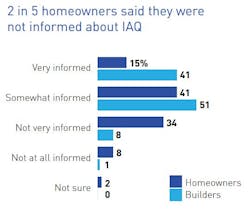Panasonic Survey Reveals Indoor Air Quality Concerns, Knowledge Gaps
PRESS RELEASE
Feb. 8, 2022 - A survey conducted by Panasonic of homeowners and homebuilders across North America has revealed concern in both groups over the impact of indoor air quality on short- and long-term health issues.
The survey was conducted in December 2021, and has been captured in a free report titled, "How healthy is my home?". Questions were intended to measure respondents' knowledge of the risks of indoor air pollution and the impact of technological solutions to improve indoor air quality (IAQ) in homes. The survey found significant changes in participants’ perceptions and behaviors when presented with scientific findings around indoor air quality’s impact on short term and long-term health issues. Post-survey, one-in-four homeowners showed increased interest to invest in IAQ solutions, and the likelihood for building professionals to recommend IAQ technologies to homeowners increased to 62 percent, up from 49 percent.
With the growing focus on health and wellness during the pandemic and consumers spending more on green cleaning products and organic foods1, PanasonicAmong builders surveyed, 7 in 10 identified ventilation and filtration as helpful, but fewer than half identified humidification and dehumidification. As a segment, HVAC contractors underperformed, with only about half recognizing each IAQ mitigation strategy on average.
“Many people are not aware that indoor air can be five times more polluted than outdoor, which could lead to serious and life-threatening health risks,” said Kevin Smith, general manager of Life & Device Solutions Division and Visual Solutions, Panasonic Canada. “Educating homeowners and builders on the importance of IAQ and solutions for filtration, ventilation, purification and management of indoor air is essential for maintaining a healthy living environment. Our research found that conversations around IAQ are vital between homeowners and homebuilders, to drive healthier living and a change in the industry," Smith said.
Key findings:
- After exposure to IAQ scientific findings, the number of homeowners who viewed their own homes as somewhat or very unhealthy more than tripled, from 12 percent to 39 percent. For homebuilders, the number more than doubled, from 29 percent to 62 percent. .
- Post-survey, two out of three homebuilders considered IAQ to be much more important, with 62 percent recommending IAQ solutions, up from 49 percent before learning of risks mitigation through IAQ technologies.
- Life-threatening health risks were seen as the top factors to elevate the importance of IAQ for both homeowners and homebuilders. The risk of off-gassing from volatile organic compounds (VOCs) in many building materials was the second most compelling fact for both groups.
- 62 percent of current and prospective homeowners put a lot of value in healthy home environments but prioritized factors like natural light and lack of clutter over less visible factors like IAQ, green building and cleaning products, prior to exposure to the IAQ scientific findings. Only a small percentage of homeowners considered the air in their homes to be somewhat unhealthy (10 percent) or very unhealthy (two percent), and only one out of eight homeowners felt they had any health issues from poor IAQ.
- Over 70 percent of builders recognized ventilation and filtration as helpful strategies for addressing poor IAQ.
- High-efficiency particulate absorbing (HEPA) filtration and high-performance HVAC systems were the IAQ technologies most likely to be recommended by homebuilders. HEPA filters are more than 99.97 percent efficient at capturing airborne viral particles associated with COVID-192, and improved ventilation improves health outcomes in a majority of scientific studies, with health improvement generally in the 20 percent to 50 percent range3.
- In what Panasonic described as a "disconnect," builders believed homeowners were twice as likely to make energy efficiency a top two priority vs. a healthy living environment (20 percent vs. 10 percent). In fact, homeowners rated them as equal priorities (14 percent), perhaps driven by the attention indoor air quality has received since the pandemic.
CLICK HERE for information related to Panasonic and indoor air quality.
1 McKinsey: "Feeling good: The future of the $1.5 trillion wellness market, 2021"
2 ASHRAE, FAQs
3 Lawrence Berkeley National Laboratory webinar, "Do Residential Ventilation Rates Affect Respiratory Health?"

